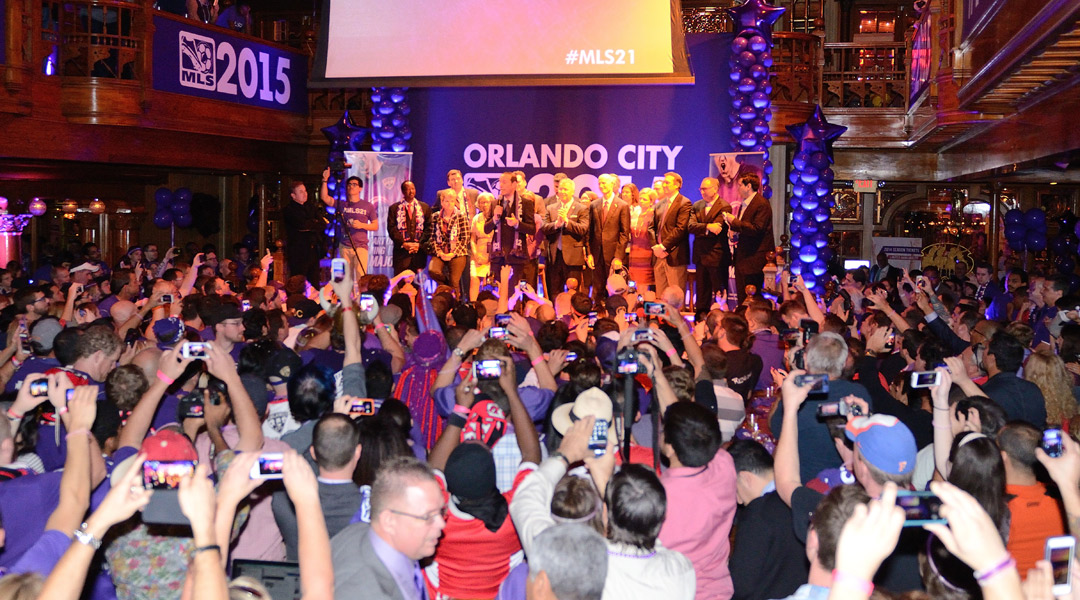The man who brought Major League Soccer to Orlando City
Tim Stannard gets the lowdown from the man behind the new Florida side....

And then there were 21. Orlando City are set to make their MLS debut in 2015, vindicating an awful lot hard of hard work from the club to achieve their status. One of those responsible for making a dream become reality is part-owner and president Phil Rawlins, who also happens to part-own Stoke too.
FFT caught up with an Englishman abroad in Florida to discuss the new franchise and the future of the North American game.
For those who don't know, tell us about Orlando City...
We started in Austin back in 2007 and did quite well there. We had very high aspirations and ambitions: we wanted to be in Major League Soccer. We knew we weren't going to get there based in Austin, as Texas already has two teams; the Houston Dynamo and FC Dallas. MLS has a vacuum in the south east, so the ownership team took a decision in late 2010 to move the franchise to Orlando and take the club to the next level. We identified Florida as what we thought was a great market place, so we set up Orlando City.
We're very much a developmental club. We believe in playing attractive, open football, and so far it has been very successful for us. We’ve sent six players into MLS in the past three years. We love to develop talent, get the ball down and entertain the crowds. We are now the best-supported club outside of MLS, averaging around 8,000 per game. We're looking forward to taking the next step and becoming an MLS club.
Get FourFourTwo Newsletter
The best features, fun and footballing quizzes, straight to your inbox every week.
You've been building a club from scratch. It must be a fascinating challenge?
It’s one of the great draws for me. It’s rare that you get the opportunity in life to do something from scratch like this and you hope it will last another 150 years. You look to Seattle and the Portland Timbers, who have been around approaching 50 years now. People forget that. There is a tradition of soccer in the States that is getting revived and revitalised. It’s really taking off.
Is it hard having no relegation and promotion within MLS?
Quite frankly it’s very unlikely there ever will be. People have to bear in mind that there is a slightly different mindset in the U.S. with sport. There’s a franchise model and we don’t have that concept in the rest of the world. It's a tradition. You pay the league a fee, you buy the rights and then you put the team into the league system. And when you've paid a lot of money you don’t want to see it going up and down in a relegation system. The way you get there is proving there is a market place that is viable, supported and has a passion for the game. It has to have corporate support that can sustain itself. And you have money in the bank to pay the fee and run the club properly. It’s a lot about sustainability. You have to be in a good place to sustain the club and grow the league.
One positive with the MLS is that it is infinite in terms of places, though...
Obviously there will be limits to the number of teams, as there are only so many major market places. If we are honest and look at the Premier League or La Liga, there are two or three clubs that can win it and that’s it. I grew up a Stoke City fan in the 1970s and I remember us being top of the league and having a chance of winning the division. As fans, we have to be honest and say it’s the current economic realities.
It’s not true in the MLS. It was created with a socialist model. It shares gate revenues and it shares ticket revenues. It shares its player costs. It’s a very clever, sensible model that has been built for a level of parity. You have the draft system that means those at the bottom are given the first pick of the best young talent. Everything about it is designed for equality, which means from the fans' standpoint anyone can win the league.
Does this system give managers more stability?
If you look at our club we’ve had the same coach, Adrian Heath, for six years now. The first contract he had was for three years. He knows he has stability, and he’s taking the journey with us. We are looking ahead two years and talking to him about how we build a squad for MLS. It’s difficult to do in the more traditional system that you and I know. It is difficult to give a manager that tenure, because a coaching job is a tough one. Manchester United benefited from 26 years of Sir Alex Ferguson. Coaches know that there is a little less pressure here and they aren't under the gun every Saturday if they don’t win. They can look to the future and build, and that's one of the benefits of MLS.
Losing two games in a row in MLS isn't unusual. Every match seems to be a tough challenge, doesn't it?
If you ask most fans of Premier League clubs who came up from the Championship, they will miss it a bit. Most English fans go into a game against Chelsea or Manchester City and wonder how many they are going to lose by. It’s not the greatest feeling in the world to go into a game like that. In MLS everyone has a chance of winning, and every game could go either way. A team can turn itself around halfway through a season and become champions.
I find it very ironic that the biggest capitalist system in the world should have the best sports league, the NFL, and it's a socialist model. It’s cooperative. The fans want to see a competitive game on the field, and they want to see equality. On a Monday morning, your team and my team should be getting together to figure out how can we make the most money out of sponsorship we can, how can we maximise ticket revenues. What are the best marketing ideas? Teams need to collaborate off the field and compete on it, and that is what the MLS model is built on. I think it's a platform that will give it a very strong future.
Joe was the Deputy Editor at FourFourTwo until 2022, having risen through the FFT academy and been on the brand since 2013 in various capacities.
By weekend and frustrating midweek night he is a Leicester City fan, and in 2020 co-wrote the autobiography of former Foxes winger Matt Piper – subsequently listed for both the Telegraph and William Hill Sports Book of the Year awards.

